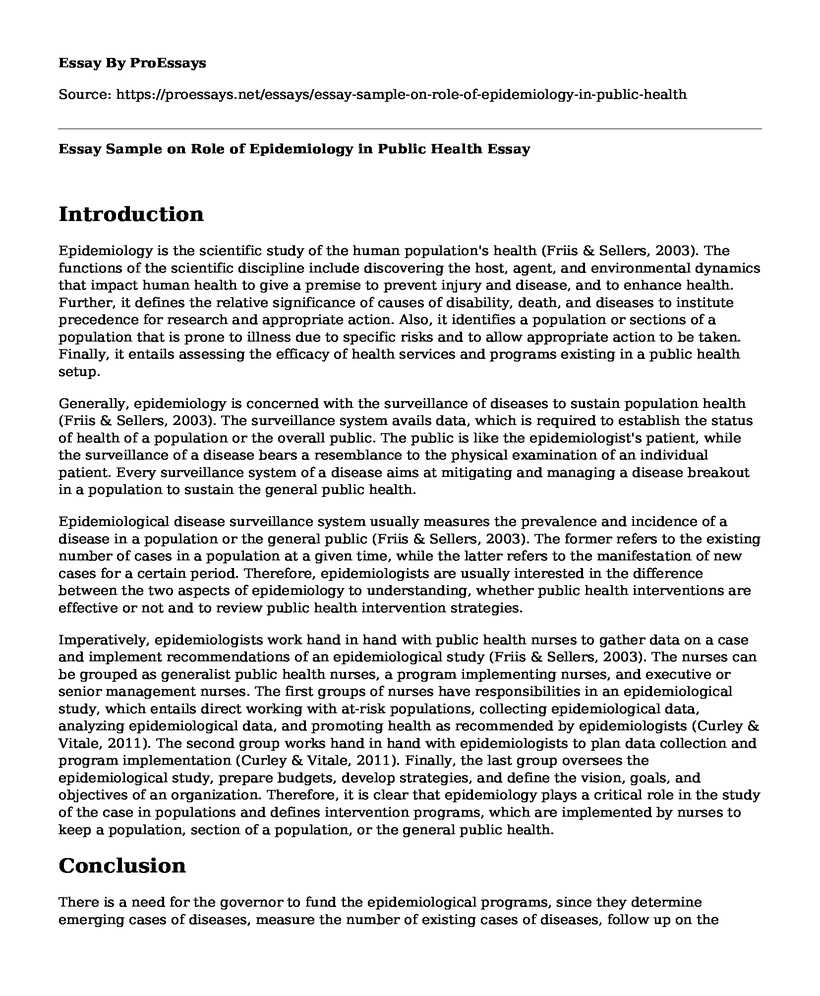Introduction
Epidemiology is the scientific study of the human population's health (Friis & Sellers, 2003). The functions of the scientific discipline include discovering the host, agent, and environmental dynamics that impact human health to give a premise to prevent injury and disease, and to enhance health. Further, it defines the relative significance of causes of disability, death, and diseases to institute precedence for research and appropriate action. Also, it identifies a population or sections of a population that is prone to illness due to specific risks and to allow appropriate action to be taken. Finally, it entails assessing the efficacy of health services and programs existing in a public health setup.
Generally, epidemiology is concerned with the surveillance of diseases to sustain population health (Friis & Sellers, 2003). The surveillance system avails data, which is required to establish the status of health of a population or the overall public. The public is like the epidemiologist's patient, while the surveillance of a disease bears a resemblance to the physical examination of an individual patient. Every surveillance system of a disease aims at mitigating and managing a disease breakout in a population to sustain the general public health.
Epidemiological disease surveillance system usually measures the prevalence and incidence of a disease in a population or the general public (Friis & Sellers, 2003). The former refers to the existing number of cases in a population at a given time, while the latter refers to the manifestation of new cases for a certain period. Therefore, epidemiologists are usually interested in the difference between the two aspects of epidemiology to understanding, whether public health interventions are effective or not and to review public health intervention strategies.
Imperatively, epidemiologists work hand in hand with public health nurses to gather data on a case and implement recommendations of an epidemiological study (Friis & Sellers, 2003). The nurses can be grouped as generalist public health nurses, a program implementing nurses, and executive or senior management nurses. The first groups of nurses have responsibilities in an epidemiological study, which entails direct working with at-risk populations, collecting epidemiological data, analyzing epidemiological data, and promoting health as recommended by epidemiologists (Curley & Vitale, 2011). The second group works hand in hand with epidemiologists to plan data collection and program implementation (Curley & Vitale, 2011). Finally, the last group oversees the epidemiological study, prepare budgets, develop strategies, and define the vision, goals, and objectives of an organization. Therefore, it is clear that epidemiology plays a critical role in the study of the case in populations and defines intervention programs, which are implemented by nurses to keep a population, section of a population, or the general public health.
Conclusion
There is a need for the governor to fund the epidemiological programs, since they determine emerging cases of diseases, measure the number of existing cases of diseases, follow up on the effectiveness of intervention programs, and determine the health needs of the population. These epidemiological activities ensure that surveillance of diseases takes place accordingly. Thus new cases can easily be detected and managed effectively while existing cases can be managed through scientific-based interventions programs. However, two core competencies are necessary for the programs to be implemented effectively and to ensure compliance with Quad competencies requirements for public health nursing practice, which include population and community health assessment and analysis and public health science in nursing practice.
References
Curley, A. L. C. & Vitale, P. A. (2011). Population-based nursing: Competencies and concepts for advanced practice. New York: Springer Publishing.
https://phabc.org/public-health-core-competency-development/
Friis, R. H. & Sellers, T. A. (2003). Epidemiology for public health practice. Burlington, MA: Jones & Bartlett. ISBN: 978-14496-6549-4. Retrieved from https://ajph.aphapublications.org/doi/pdf/10.2105/AJPH.89.8.1158
Cite this page
Essay Sample on Role of Epidemiology in Public Health. (2022, Nov 16). Retrieved from https://proessays.net/essays/essay-sample-on-role-of-epidemiology-in-public-health
If you are the original author of this essay and no longer wish to have it published on the ProEssays website, please click below to request its removal:
- High Levels of Curative Health Expenditures
- Essay Example on Nursing: Florence Nightingale's Environmental Theory
- Alzheimer's Disease: Risk Factors, Pathophysiology, & Protective Measures - Essay Sample
- Nursing Profession-5 Core Values, Responsibilities & Impact - Essay Sample
- Genetic Factors Impacting Body Weight: A Lengthy Discussion - Essay Sample
- Free Paper on Cardiovascular Diseases: Types, Causes & Effects
- Free Essay Sample on Healthy Lifestyle Resources in NYC







